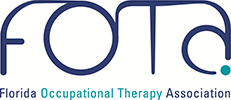 Oh, My Aching Neck!
Oh, My Aching Neck!
Regina Bonynge, OTR/L CWEC, CEAS Work Programs Special Interest Chair
Many employees are saying these exact words thinking it is the physical environment that is contributing to their aches and pains. An ergonomic assessment is requested and the following is uncovered:
- Monitors are directly in line with the user and eye level head and neck are in a neutral position.
- The keyboard and mouse are positioned such that the upper extremities are in a neutral position.
- The chair is adjusted to provide lumbar support and is comfortable.
- The lighting is good and without glare.
- The items frequently used are without the primary workspace.
All checks out…… The National Institute for Occupational Safety and Health (NIOSH) is committed to providing organizations with knowledge to reduce the threat to health workers. The identification of early warning signs of job stress followed by resolutions are key factors in keeping employees health.
Job stress is different from job challenge. Challenge energizes us psychologically and physically and it motivates us to learn new skills and master our jobs. However, the challenge can turn into job demands that cannot be met, relaxation can turn into exhaustion, a sense of satisfaction can turn into feelings of stress and illness, injury, job failure, and burn out.
NIOSH believes that working conditions play a key role in causing job stress however individual factors cannot be ignored. Job stressors can have a direct influence on a workers safety and health but individual factors can either strengthen or weaken this influence. Jobs stressors may include but not be limited to task design, management style, interpersonal relationships, work roles, career concerns, and environmental conditions. Stress sets off an alarm in the brain preparing the body for defense mode. Short lived stress pose little risk to a person. But when stressful situations go unresolved and the body is kept in a constant state of activation, the biological systems begin to break down. Stress can contribute to chronic health problems – cardiovascular disease, musculoskeletal disorders, and psychological disorders.
Stress management…..how to manage? how to start to manage?
- Track the stressors by keeping a journal for a week or two to identify situation that create the most stress and how you respond to them. Record thoughts, feelings, and information about the environment, including people and circumstances involved, the physical setting and how you reacted – raise voice? Go for a walk? Eat?
- Develop healthy responses by making healthy choices when you feel the tension rise. Exercise is a great stress-buster. Yoga can be an excellent choice, but any form of physical activity is beneficial. Make time for hobbies and favorite activities that bring you pleasure. Getting enough good-quality sleep is also important for effective stress management. Build health sleep habits by limiting caffeine intake late in the day and minimizing stimulating activities at night.
- Establish boundaries. In today’s world it’s real easy to feel pressured to be available 24 hours a day. Establish the work-life boundaries.
- Take time to recharge. To avoid the negative effects of chronic stress and burnout, we need time to replenish and return to our pre-stress level of functioning. This recovery process requires “switching off” from work by having periods of neither engaging in work-related activities, nor thinking about them. It is critical to disconnect from time to time in a way that fits your needs and preferences. Don’t let vacation days go to waste. When possible, take time off to relax and unwind, so you can return to work reinvigorated and ready to perform at your best. If you’re not able to take time off, get a quick boost by turning off the smartphone and focus on non-work related tasks for a while (like writing this article).
- Learn how to relax. Techniques such as meditation, deep breathing exercises and mindfulness can help melt away the stress.
- Talk to your supervisor. Employee health has been linked to productivity at work, so your boss has an incentive to create a work environment that promotes employee well-being. The purpose is no to lay out a list of complaints but to come up with an effective plan for managing the stressors you have identified so you can perform at your best.
- Get some support. Help from trusted friends and family members can improve your ability to manage stress. Your employer may have stress management resources available. If these are not beneficial, then a psychologist may be.
- Some of Sarasota’s local professionals have various strategies. Steve Favia, ATC/L, CEAS II frequently states “a person’s best position is the next position. Movement is the key.” Research has shown that movement directly impacts our bodies. “Your mind and body are intimately connected. And while your brain is the master control system for your body’s movement, the way you move can also affect the way you think and feel.”
“Movement therapies are often used as adjunctive treatments for depression and anxiety when mental effort, psychotherapy, or medication is not enough. When you are too exhausted to use thought control strategies such as focusing on the positive, or looking at the situation from another angle, movement can come to the rescue. By working out, going on a meditative walk by yourself, or going for a synchronized walk with someone, you may gain access to a “back door” to the mental changes that you desire without having to “psych yourself” into feeling better.”
Nikki Cleary, LPTA, CHC, member of the AADP (American Academy of Drugless Practitioners incorporates essential oils into her practice. Frankincense, Copaiba, and Vetiver cross the blood/brain barrier. Frankincense decreases inflammation and promotes healthy cellular regeneration. Copaiba has a direct connection to the CB2 Receptors which has effects to deregulate the nervous system allowing the body to handle stress better. Vetiver assists with the reduction of anxiety and calming of the brain. Nikki also promotes the need to develop the building blocks for a healthy gut…..and without a healthy gut one cannot handle stress healthy. Lifelong Vitality supplement assists with providing the body with the foundation to handle stress. Many essential oils can be used in diffuser, applied topically or orally. It is important to research the best and safest mode of delivery.
Enhance your well-being by reducing stress and building resilience can help you identify your stress warning signs and learn how to better manage stressful situations. While some stress is inevitable, where your body repeatedly encounters a set of physiological changes dubbed the stress response, trouble can brew. Stress can contribute to or exacerbate various health problems.
Tammy Barnett, Board Certified Life Coach states that chronic or long-term ongoing stress is correlated with many physical problems such as heart disease, high blood pressure, diabetes and chronic pain. Being aware of the specific stressors present in your life along with practicing daily self-care is key to increase a greater sense of well-being. The following tips may be just what you need:
- Take an inventory of your life often. What specific situations are causing stress or potential burn out? What small changes can you make?
- Find time to relax and learn to meditate.
- Eat healthy and exercise regularly.
- Maintain a healthy support system through friends and family.
- Practice deep breathing exercises.
- Listen to soft music.
- Take walks outside in nature.
- Practice saying “No” to commitments that will lead you away from your goals. This can be hard at first. Consider saying, “I’m not sure, let me think about it and get back with you.”
“Stress Management: Enhance your well-being by reducing stress and building resilience. “Learn the warning signs ad learn how to better manage stressful situations.
ReferencesAmerican Psychological Association. (October 2018). Coping with Stress at Work. Retrieved May 13,
2019 from www.apa.org/helpcenter/work-stress.
Centers for Disease Control and Prevention and The National Institute for Occupational Safety and
Health (NIOSH). STRESS…At Work. Retrieved May 13, 2019 from www.ece.gov/niosh/docs/99-101.
Fricchione, Gregory, M.D and editors of Harvard Health Publishing (2016). Stress Management: Enhance
your well-being by reducing stress and building resilience. Retrieved May 13, 2019 from www.health.harvard.edu/min-and-mood/stress-management-enhance-your-well-being.
Segal, Jeanne, Ph.D, Smith, Melinda, M.A, Robinson, Lawrence, and Segal, Robert, M.A. (November
2018). Stress in the Workplace. Retrieved May 13, 2019 from www.helpguide.org/articles/stress/stress-in-the-workplace.htm.
